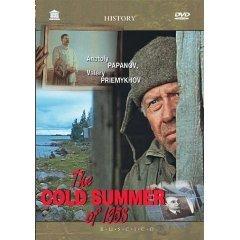“I’m not duty bound to anyone.”
It’s the Soviet Union in 1953. Stalin is dead, and Beria declares an amnesty for all the jailed criminals. In a remote Siberian village, a policeman arrives with the news of the amnesty, and he’s looking for 6 newly-released inmates. Immediately upon their release, these criminals committed an armed robbery and are now wanted men once more.
 The tiny, impoverished Siberian village is set on a river’s edge. Most of the inhabitants are elderly men and there’s also a mute woman and her buxom daughter. Two exiled political prisoners–Nikolai (Anatoli Papanov) and Sergei (Valeri Priyomykhov)–are in the village to complete their sentences for committing obscure crimes against the state. The older man, Nikolai–also known as Spade, is integrated into the village, and as he willingly joins in the work, he’s become accepted. Sergei–now know as Chaff–refuses to contribute, and the villagers are tired of feeding a man who refuses to work. Both Spade and Chaff have years left ahead in their sentences, and as political prisoners they are not included in the amnesty.
The tiny, impoverished Siberian village is set on a river’s edge. Most of the inhabitants are elderly men and there’s also a mute woman and her buxom daughter. Two exiled political prisoners–Nikolai (Anatoli Papanov) and Sergei (Valeri Priyomykhov)–are in the village to complete their sentences for committing obscure crimes against the state. The older man, Nikolai–also known as Spade, is integrated into the village, and as he willingly joins in the work, he’s become accepted. Sergei–now know as Chaff–refuses to contribute, and the villagers are tired of feeding a man who refuses to work. Both Spade and Chaff have years left ahead in their sentences, and as political prisoners they are not included in the amnesty.
The 6 brutal criminals invade the village and hold the villagers hostage. This event becomes a moment of truth for both Chaff and Spade–should they escape and save their own skins–or do they assist the villagers?
On one level, The Cold Summer of 1953 from director Aleksandr Proshkin is a marvelous, tense action story. But on another deeper level, the film is an allegory for Soviet politics. The violent criminals represent the state–invading, imprisoning and murdering. The people (the villagers in this case) passively accept orders–even those that include the death of another human being. And the only men to resist the newly arrived criminal regime are–of course–the two political prisoners. Some of the film’s first scenes show the village government worker ensconced in his hut surrounded by photos of Stalin and various Soviet dignitaries. He can’t believe that Beria–who briefly seized power is now “an enemy of the people”–but he accepts a regime change with obsequious fear and with the knowledge that he must get it right or face implied violence if he questions the political changes. To him, and to the rest of the bureaucrats in the village, a regime change–albeit even that exacted by criminals–is little different from the distant, cruel dictates of an insane state. Amazingly, The Cold Summer of 1953 was made before the fall of the Soviet Union. This film is recommended for anyone interested in Soviet cinema or politics. The DVD is in Russian with an extraordinary number of options for subtitles–a short interview with the director is included.

You must be logged in to post a comment.